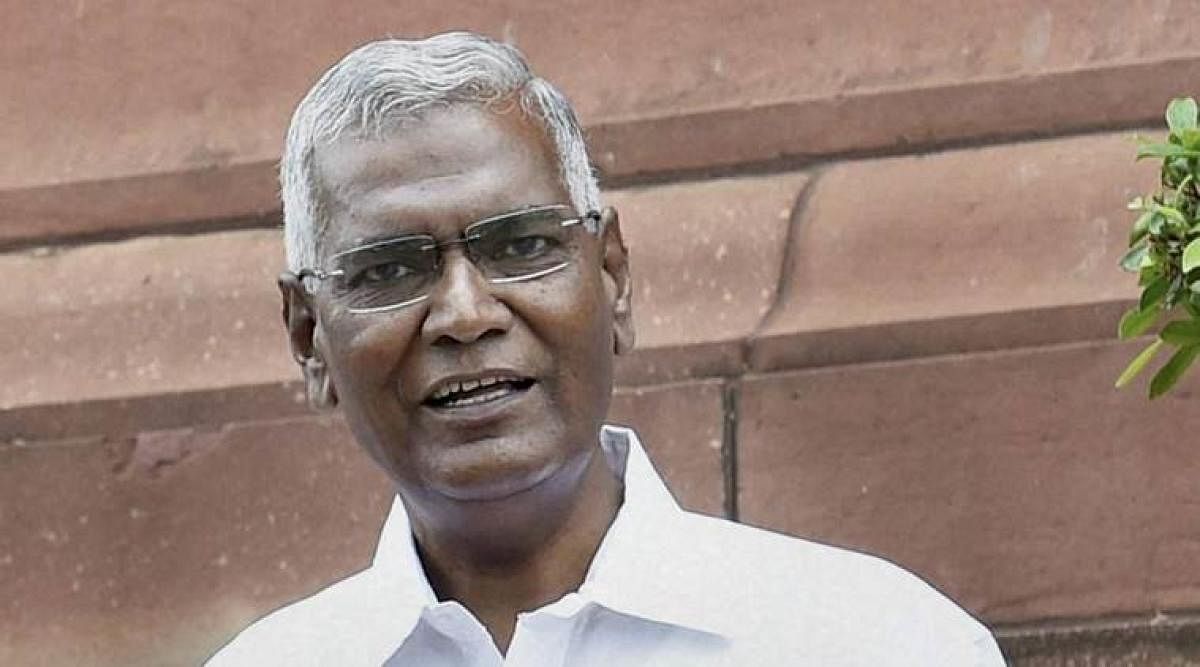
The CPI on Sunday chose senior leader D Raja as its new general secretary, the first Dalit to head a mainstream Communist party in the country.
Raja will succeed S Sudhakar Reddy, who is stepping down owing to health reasons.
To infuse young blood in top leadership, the party elevated Kanhaiah Kumar, who fought the Lok Sabha elections from Bihar's Begusarai, to the National Executive in the vacancy caused by the death of Shameem Faizee
Kumar was included in the National Council of the CPI in the Kollam Party Congress last year.
The National Council, which met here for past three days, ratified the recommendation of the National Secretariat and National Executive to choose national secretary Raja (70), presently a Rajya Sabha MP whose term in Parliament is ending on Wednesday, to succeed Reddy.
Soon after Lok Sabha results, which saw the CPI's vote share decline and the party winning just two seats, Reddy had offered to quit but the CPI leadership rejected it.
However, Reddy then cited health reasons as he was not able to cope up with pollution in Delhi and wanted to quit.
The popular face of CPI and a two-term Rajya Sabha MP from Tamil Nadu who rose as a student and youth leader, Raja shifted to Delhi in the early 1990s for political work and was appointed national secretary in 1994.
He had worked under former CPI general secretaries Indrajit Gupta, A B Bardhan and Reddy and had attended crucial meetings of the United Front, which chose H D Deve Gowda and I K Gujral as prime ministers. He was also part of the UPA-Left Coordination Committee before the Left withdrew support to the Manmohan Singh government.
He assumes office at a time the CPI and the Left have lost electoral space and one of the immediate challenges before him is to enthuse the cadre to take on the Narendra Modi government.
“The country is going through a critical period under the fascist regime of Modi. The Left might have lost seats in the Lok Sabha election and might have been reduced to a smaller force in Parliament, but it does not mean that we have shrunk within the country or our ideological and political influence has shrunk. We are the hope for the people of this country,” Raja told a press conference along with Reddy.
Emphasising that the Left parties would continue to fight the “retrograde policies” of the BJP-led government, he said, “the BJP government may have won the electoral battle but not the social or the political one. We want all communist parties to come together. We will have to rework our strategies. That’s what our parties are trying to do."
Ramakrishna Panda (Odisha) and Manish Kunjam (Chhattisgarh), leaders of All India Adivasi Mahasabha were also co-opted as invitees to the National Executive.
Analysing the Lok Sabha results, the National Council felt that despite sincere efforts to unite all secular, democratic parties to defeat the BJP, many parties which expressed that desire to unite, in "practice miserably failed due to narrow petty interests" of leaders and groups.
"Even broad understanding among the secular and Left parties, did not succeed in many states. There was a positive political atmosphere in the country a few months back. BJP was defeated in Madhya Pradesh, Rajasthan and Chhattisgarh. They were defeated in bye-elections to Parliament. Earlier they lost Karnataka also. But there was confusion as there was no uniform method of understanding among the secular and Left, except in Tamil Nadu where it yielded excellent results," the National Council said.
"No doubt the victory of NDA led by BJP is a political challenge before us. Aggressive, muscular, chauvinistic cultural nationalism as advocated by RSS needs to be countered. This is a stupendous task as any alternative narrative must embrace the concept of unity in diversity considering caste, language, religious and other difference amongst the people and also present an alternative economic development vision of inclusive and sustainable development," it said.
